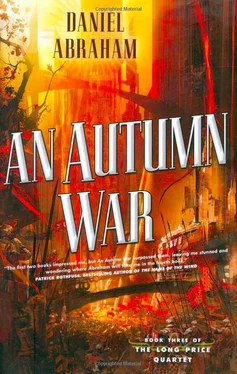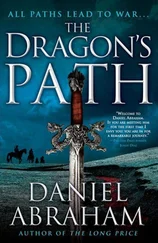Daniel Abraham - Autumn War
Здесь есть возможность читать онлайн «Daniel Abraham - Autumn War» весь текст электронной книги совершенно бесплатно (целиком полную версию без сокращений). В некоторых случаях можно слушать аудио, скачать через торрент в формате fb2 и присутствует краткое содержание. Жанр: Фэнтези, на английском языке. Описание произведения, (предисловие) а так же отзывы посетителей доступны на портале библиотеки ЛибКат.
- Название:Autumn War
- Автор:
- Жанр:
- Год:неизвестен
- ISBN:нет данных
- Рейтинг книги:4 / 5. Голосов: 1
-
Избранное:Добавить в избранное
- Отзывы:
-
Ваша оценка:
- 80
- 1
- 2
- 3
- 4
- 5
Autumn War: краткое содержание, описание и аннотация
Предлагаем к чтению аннотацию, описание, краткое содержание или предисловие (зависит от того, что написал сам автор книги «Autumn War»). Если вы не нашли необходимую информацию о книге — напишите в комментариях, мы постараемся отыскать её.
Autumn War — читать онлайн бесплатно полную книгу (весь текст) целиком
Ниже представлен текст книги, разбитый по страницам. Система сохранения места последней прочитанной страницы, позволяет с удобством читать онлайн бесплатно книгу «Autumn War», без необходимости каждый раз заново искать на чём Вы остановились. Поставьте закладку, и сможете в любой момент перейти на страницу, на которой закончили чтение.
Интервал:
Закладка:
The towers of Machi seemed to touch the lowest clouds. It had been years since Maati had gone up one of the great towers. He remembered the platform swaying, its great arm-thick chains clanking against the stones as he rose. That far above the city, he had felt he was looking out from a mountain peak-the valley spread below so vast he'd imagined he could almost see the ocean. Not remotely truth, but what it felt like all the same. Looking at the towers now, he remembered what Cehmai had said. If there were an earthquake, the towers would certainly fall. For an instant, he imagined the stones pattering down in a deadly rain, the long, slumped piles of rubble that would lie where they fell. The corpses of giants.
He shook himself, pushing the darkness away, and turned back toward the palaces. He wondered, as he trundled toward the library, where Nayiit was today. He had seen the boy-a man old enough to have a child of his own, and still in Maati's mind a boy-several times since his arrival. Dinners, dances, formal meetings. They had not yet had a conversation as father and son. Maati wondered whether he wanted them to, or if the reminder of what might have been would be too uncomfortable for them both. Perhaps he could track the boy down, show him through the city for a day. Or through the tunnels. There were a few teahouses still in business down in their winter quarters. That was the sort of thing only a local would know. Maybe the boy would be interested…
He paused as he rounded the slow curving path toward the library. Two forms were sitting on its wide stone steps, but neither of them was Nayiit. The older, rounder woman wore robes of seafoam green embroidered with yellow. Liat's hair was still as dark as when she'd been a girl sitting beside him on a cart leaving Saraykeht behind them. Her head still took the same just-off angle when she was speaking to someone to whom she was trying especially to he kind.
The younger looked thin and coltish beside her. Her robes were deep blue shot with white, and Eiah had her hair up, held in place with thick silvered pins that glittered even from here. She was the first to catch sight of him, and her thin arm rose, waving him nearer. He was too thick about the belly these days to trot or he would have.
"We've been waiting for you," Eiah said as he drew near. Her tone was accusing. Liat glanced up at him, amused.
"I was seeing Cehmai off on his journey," Maati said. "He's going to the Radaani mines in the North. A new vein, I think. But I did take the longer way hack. If I'd known you were waiting, I'd have been here sooner.
Eiah considered this, and then without word or gesture visibly accepted the apology.
"We've been talking about marriage," Liat said.
"I)id you know that Liat-cha never got married to anyone? Nayiit's her son. She had a baby, but she's never been wed?"
"Well, the two things aren't perfectly related, you know," Maati began, but Eiah rolled her eyes and took a pose that unasked the question.
"Eiah-cha and I were going to the high gardens. I've packed some bread and cheese. We thought you might care to join us?"
"You've already eaten," Eiah said, pointing to the waxed paper in his hand.
"Phis?" Maati said. "No, I was feeding this to the pigeons. Wait a moment, I'll get a jug of wine and some bowls…
"I'm old enough to drink wine," Eiah said.
"Three howls, then," Maati said. "Just give me a moment."
He walked back to his apartments, feeling something very much like relief. The afternoon trapped with old scrolls and codices, books and frail maps was banished. He was saved from it. He threw the waxed paper with the remaining onions into a corner where the servants would clean it, took a thick earthenware jug of wine off his shelves, and dropped three small wine bowls into his sleeve. On his way back out to the steps, where he was certain no one could see him, he trotted.
Danat's cough had returned.
Otah had filled his day playing Khai Machi. He had reviewed the preparations for the Grand Audience he was already past due holding. There was an angry letter from the Khai "Ian-Sadar asking for an explanation of Otah's decision not to take his youngest daughter as one of his wives that he responded to with as much aplomb as he could muster. His Master of Stone-responsible for keeping the books of the cityhad discovered that two of the forms from which silver lengths were struck had been tampered with and reported the progress of his investigation into the matter. The widow of Adaiit Kamau demanded an audience, insisting again that her husband had been murdered and demanding justice in his name. The priests asked for money for the temple and the procession of the beasts. A young playwright, son of Oiad How of House How, had composed an epic in the honor to the Khai Machi, and asked permission to perform it. Permission and funding. The representative of the tinsmiths petitioned for a just distribution of coal, as the ironworkers had been taking more than their share. The ironworkers' explaining that they worked iron, not-sneering and smiling as if Otah would understand-tin. And on and on and on until Otah was more than half tempted to grab a passing servant, put him on the black lacquer chair, and let the city take its chances. And at the end, with all the weight of the city and the impending death of Galt besides, the thing that he could not face was that Danat's cough had returned.
The nursery glowed by the light of the candles. Kiyan sat on the raised bed, talking softly to their son. Great iron statues of strange, imagined beasts had been kept in the fire grates all day and pulled out when night fell, and as he quietly walked forward, Otah could feel the heat radiating from them. The physician's assistant-a young man with a serious expression-took a respectful pose and walked quietly from the room, leaving the family alone.
Otah stepped up to the bedside. Danat's eyes, half closed in drowse, shifted toward him and a smile touched Otah's mouth.
"I got sick again, Papa-kya," he said. His voice was rough and low; the familiar sign of a hard day.
"Don't talk, sweet," Kiyan said, smoothing I)anat's forehead with the tips of her fingers. "You'll start it again."
"Yes," Otah said, sitting across from his wife, taking his son's hand. "I heard. But you've been sick before, and you've gotten better. You'll get better again. It's good for boys to be a hit ill when they're young. It gets all the hardest parts out of the way early. Then they can be strong old men.
"Tell me a story?" Danat asked.
Utah took a breath, his mind grasping for a children's story. He tried to recall being in this room himself or one like it. He had been, when he'd been I)anat's age. Someone had held him when he'd been ill, had told him stories to distract him. But everything in his life before he'd been disowned and sent to the school existed in the blur of halfmemory and dream.
"Papa-kya's tired, sweet," Kiyan said. "Let Mama tell you about. .
"No!" Danat cried, his face pulling in-mouth tight, brows thunderously low. "I want Papa-kya-"
"It's all right," Otah said. "I'm not so tired I can't tell my own boy a story."
Kiyan smiled at him, her eyes amused and apologetic both. I tried to spare you.
"Once, hack before the Empire, when the world was very new," Otah said, then paused. "There, ah. There was a goat."
The goat-whose name was coincidentally also Danat-went on to meet a variety of magical creatures and have long, circuitous conversations to no apparent point or end until Utah saw his son's eyes shut and his breath grow deep and steady. Kiyan rose and silently snuffed all but the night candle. The room filled with the scent of spent wicks. Otah let go of his son's hand and quietly pulled the netting closed. In the near-darkness, Danat's eyelids seemed darker, smudged with kohl. His skin was smooth and brown as eggshell. Kiyan touched Otah's shoulder and motioned with her gaze to the door. He laced his fingers in hers and together they walked to the hallway.
Читать дальшеИнтервал:
Закладка:
Похожие книги на «Autumn War»
Представляем Вашему вниманию похожие книги на «Autumn War» списком для выбора. Мы отобрали схожую по названию и смыслу литературу в надежде предоставить читателям больше вариантов отыскать новые, интересные, ещё непрочитанные произведения.
Обсуждение, отзывы о книге «Autumn War» и просто собственные мнения читателей. Оставьте ваши комментарии, напишите, что Вы думаете о произведении, его смысле или главных героях. Укажите что конкретно понравилось, а что нет, и почему Вы так считаете.










